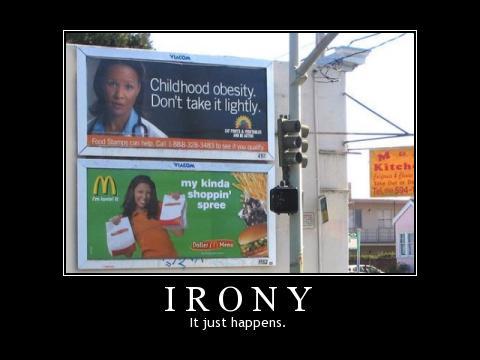
Most of us have probably heard the term ‘delicious irony’ used in conversation. Every now and then, though, irony rises figuratively, if not literally, to the criminal level, and demands the attention of the irony police. ‘Irony police’ are related to the ‘fashion police’ my daughter called out for when she saw someone in public who was clearly in violation of the laws of publicly acceptable dress. Lately, we’ve noticed that fashion police are needed more than ever, but for different infractions. We’ll leave that alone for now, but maybe take a crack at the story sometime in the future.
Getting back to the present, we think we’ve come across a case of ‘criminal irony,’ which we’re code-naming an 85, in the current public square discussions. 85 signals the fact that one more violation would merit charging the perp with an 86.

Maybe you don’t know what being 86’ed means. If not, here’s your chance to grow:
eighty-six; noun
- A cook's term for ''none'' or ''nix'' when asked for something not available (1930s+ Lunch counter)
- A person who is not to be served more liquor : known as an ''eighty-six,'' which means: ''Don't serve him'' (1930s+ Bartenders)
Our case in point for today, which has the irony alarms going off at Other Side offices, is based on a newsletter published by TrainRiders Northeast in 2004. That issue front-paged a column called “Why We Like The Train,” and we’re sure we’ve posted it in its entirety in the past. We have no doubt it was penned by Wayne Davis, founder and head of the organization to this day, and the chief lhobbyist for the Downeaster, and NNEPRA in particular.
The passage of interest for today is this one, which ends the column:
In case they don’t jump right out at you, we’re going to summarize the relevant ironies for you. They apply, almost totally, to our context here in Maine and the lovely, perfect town of Brunswick.
1) Powerful vested interests: one might include in this group TRNE, NNEPRA, the BDA, and AAB, among others. All are engaged in promoting the Downeaster and passenger rail travel no matter how tortured the reasoning has to be, and no matter how cognitively dissonant they need to be. Lately, they’ve taken to barraging Sen. Stan Gerzofsky with complaints about his sponsorship of a bill that would prohibit excessive idling of passenger trains, even though environmental concerns are at the heart of the subject.
2) WHAT DO WE NOT LIKE ABOUT TRAINS - nothing: 2004, of course, was a bit early for Wayne or any of the other zealots (powerful vested interests) to have experienced the nostalgic pleasures of clouds of diesel fumes and dust descending upon their residences for several hours per day. Somehow, the pride of our community, the Maine Street Station, has managed to escape the privilege. We wonder how they (it) would adapt to such “nothingness.”
3) Petroleum interests: this boils down to two things we can think of. The first is unwarranted consumption of petroleum fuels. As part of the supporting rationale for LD 439, the proposed bill that would prohibit excessive idling, it’s been pointed out that Downeaster engines sit and idle for about 60% of their average daily operating schedule, meaning they’re consuming fuel and belching fumes and particulates for no useful purpose. To the tune of nearly $1 million a year in wasted fuel.
Then there’s the issue of carbon footprint as it relates to alternative modes of transportation. In this report: http://www.ucsusa.org/sites/default/files/legacy/assets/documents/clean_vehicles/greentravel_report.pdf, published in 2008, passenger trains don’t make out too well. You can go to page 10 of the document for a quick summary.
When you do, keep in mind that Downeaster locomotives are grandfathered under modern-day EPA rules, and could not be certified for use if they were coming off the factory production line. Then there’s the issue of how many seats are occupied, and how the calculations are made. The average Downeaster running to and from Brunswick is operating at less than 20% capacity, which would surely tilt the footprint statistics seriously against the train.
Now factor in idling 60% of the daily operating cycle, and we think you’d have a transit modality that sinks far below the results shown. We know of no-one who idles their personal vehicles anymore than absolutely necessary, and we’re quite positive that motorcoaches don’t either.
4) Integrity of the land: the details made clear in the DEP SWPA proceedings, combined with the report just referenced, make using terms like this beyond bizarre. Imaginary axis, anyone?
5) Humane: any ‘humane’ consideration of the detrimental health consequences inflicted upon Cedar Street and Bouchard Drive neighborhoods would result in a summons to appear before the Superior Magistrate of Criminal Irony to answer charges. And how is burning diesel fuel in non-compliant engines (except for grandfathering) for 40 hours or so a day “humane?”
6) Economic growth: as if there wasn’t enough ‘humor’ already pertaining to the discussion. We could recite our failed attempts to get some objective documentation of the economic benefits here in town, but why bother? Except maybe for Brunswick Taxi. We should note that Portland, the nucleus of Downeaster economic energy generation, has been notably absent in providing objective evidence of their benefits.
We think the decision of any reasonable judge in the matters described should find the charges call for Class A Irony penalties.
Not that reason applies when it comes to trains.

No comments:
Post a Comment